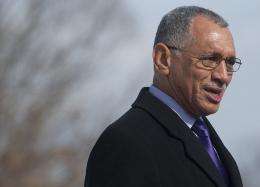US must be 'unafraid' of private spaceflight: NASA

NASA's chief said Wednesday that America must be "unafraid" of a new future in spaceflight and vowed full confidence that private business can come up with a solution to replace the space shuttle.
Charles Bolden faced some skepticism as he testified before the House Committee on Science, Space and Technology to discuss President Barack Obama's fiscal year 2012 budget request of $18.7 billion for NASA.
"I am certain that commercial entities can deliver," said Bolden, who fielded questions about cost, safety and how long it will take to forge a new mode of access to the International Space Station after the US shuttle program retires later this year.
"We have got to develop commercial capability to get into low Earth orbit," said the former astronaut. "The nation needs to become unafraid of exploration. We need to become unafraid of risks."
In December 2010, SpaceX became the first private company to successfully launch its own space capsule into orbit and back, a feat Bolden described as "awesome."
The Dragon capsule carried no crew, but SpaceX is working on a cargo launch to the orbiting international space lab for later this year.
Bolden said NASA was sticking to its planned 2015-2016 timeframe for developing a new mode of travel for taking crew into orbit, but added that is "dependent" on private industry.
Industry leaders have promised it would take "three years to the day after they sign a contract" to get a spacecraft up and running for crew transport, he said. No one has yet signed such a contract.
Obama's draft budget proposes $850 million in 2012 as seed money to help companies devise a new crew capsule for orbital travel, a $350 million increase over 2010 levels.
Asked by one Florida lawmaker what he should tell the thousands of his constituents who will lose their jobs at Kennedy Space Center once the shuttle program ends, Bolden answered:
"You should tell them the future of human spaceflight is bright and robust and we need their help in rapidly developing new systems so we can go and explore."
The 30-year-old US space shuttle program is set to end after the final two launches -- Endeavour in April and Atlantis in June.
Asked about the final mission by Atlantis, STS-135, and how big a priority it may be for NASA amid questions over whether it will really be funded, Bolden responded: "STS-135 is on my schedule and I intend to fly STS-135 in June.
"Unless this Congress does something that changes the fiscal status of present conditions -- and you can do that, if you take drastic action," he said.
The first of the remaining three-member fleet to retire, Discovery, is currently on its last mission to the ISS and is scheduled to return to Earth on March 8.
After the final two US shuttles retire -- two of the original five-member orbital fleet have exploded in flight, killing everyone on board -- astronauts will rely on Russia's Soyuz craft for access to the ISS.
"I don't want to do that forever," said Bolden, who also praised the Russian space program and recalled how Russia helped carry astronauts for two years after the Columbia shuttle disintegrated on its way back to Earth in 2003.
"I want to have American-made rockets and American-made capsules to take our astronauts back and forth," said Bolden, who has flown on four shuttle missions and supervised safety efforts after the 1986 Challenger explosion.
A group of 50 self-described "space leaders" -- including former astronauts and business people -- on Tuesday sent a letter to Congress urging support for government partnerships with private industry to accelerate a US return to human spaceflight and save cash.
"NASA's competitive commercial crew... represents one of the best means to prevent damage to NASA's human spaceflight capabilities in the face of across the board spending cuts being discussed by Congress," it said.
As many as eight companies are believed to be working on commercial crew projects, including SpaceX, Boeing, Orbital Sciences, United Launch Alliance, Blue Origin, Sierra Nevada, Alliant Techsystems and Excalibur Almaz.
(c) 2011 AFP




















